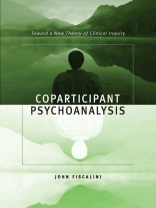Traditionally, two clinical models have been dominant in psychoanalysis: the classical paradigm, which views the analyst as an objective mirror, and the participant-observation paradigm, which views the analyst as an intersubjective participant-observer. According to John Fiscalini, an evolutionary shift in psychoanalytic consciousness has been taking place, giving rise to coparticipant inquiry, a third paradigm that represents a dramatic shift in analytic clinical theory and that has profound clinical implications.
Coparticipant inquiry integrates the individualistic focus of the classical tradition and the social focus of the participant-observer perspective. It is marked by a radical emphasis on analysts’ and patients’ analytic equality, emotional reciprocity, psychic symmetry, and relational mutuality. Unlike the previous two paradigms, coparticipant inquiry suggests that we are all inherently communal beings and, yet, are simultaneously innately self-fulfilling, unique individuals. The book looks closely at the therapeutic dialectics of the personal and interpersonal selves and discusses narcissism—the perversion of the self—within its clinical role as the neurosis that contextualizes all other neuroses. Thus the goal of this book is to define coparticipant inquiry; articulate its major principles; analyze its implications for a theory of the self and the treatment of narcissism; and discuss the therapeutic potential of the coparticipant field and the coparticipant nature of transference, resistance, therapeutic action, and analytic vitality. Fiscalini explores ‘analytic space, ‘ which marks the psychic limit of coparticipant activity; the ‘living through process, ‘ which, he suggests, subtends all analytic change; and ‘openness to singularity, ‘ which is essential to analytic vitality.
Coparticipant Psychoanalysis brings crucial insights to clinical theory and practice and is an invaluable resource for psychoanalysts and therapists, as well as students and practitioners of psychology, psychiatry, and social work.
विषयसूची
Introduction
Coparticipation
Coparticipation and Coparticipant Inquiry
The Core Principles of Coparticipant Inquiry
The Evolution of Coparticipant Inquiry in Psychoanalysis: A Comparative Study
The Self
The Multidimensional Self
Clinical Dialectics of the Self
Narcissism
The Self and Narcissism
Clinical Narcissism: Psychopathology of the Self
Coparticipant Inquiry and Narcissism
The Analytic Working Space
Narcissistic Dynamics and Coparticipant Therapeutics: Further Considerations
Explorations in Therapy
Openness to Singularity: The Facilitation of Aliveness in Analysis
Coparticipant Transference Analysis: Observations and Conjectures
The ‘Living Through’ Process: The Experiential and Relational Foundations of Therapeutic Action
लेखक के बारे में
John Fiscalini is a training and supervising analyst and faculty member at the William Alanson White Institute of Psychiatry, Psychoanalysis, and Psychology; director of clinical training at the Manhattan Institute for Psychoanalysis; and an associate clinical professor at the New York University postdoctoral program in psychoanalysis. He is the coeditor of Narcissism and the Interpersonal Self and a coeditor of The Handbook of Interpersonal Psychoanalysis. John Fiscalini is a training and supervising analyst and faculty member at the William Alanson White Institute of Psychiatry, Psychoanalysis, and Psychology; director of clinical training at the Manhattan Institute for Psychoanalysis; and an associate clinical professor at the New York University postdoctoral program in psychoanalysis. He is the coeditor of Narcissism and the Interpersonal Self (Columbia, 1993) and a coeditor of The Handbook of Interpersonal Psychoanalysis (Analytic Press, 1995). He is a practicing psychoanalyst in New York City.












